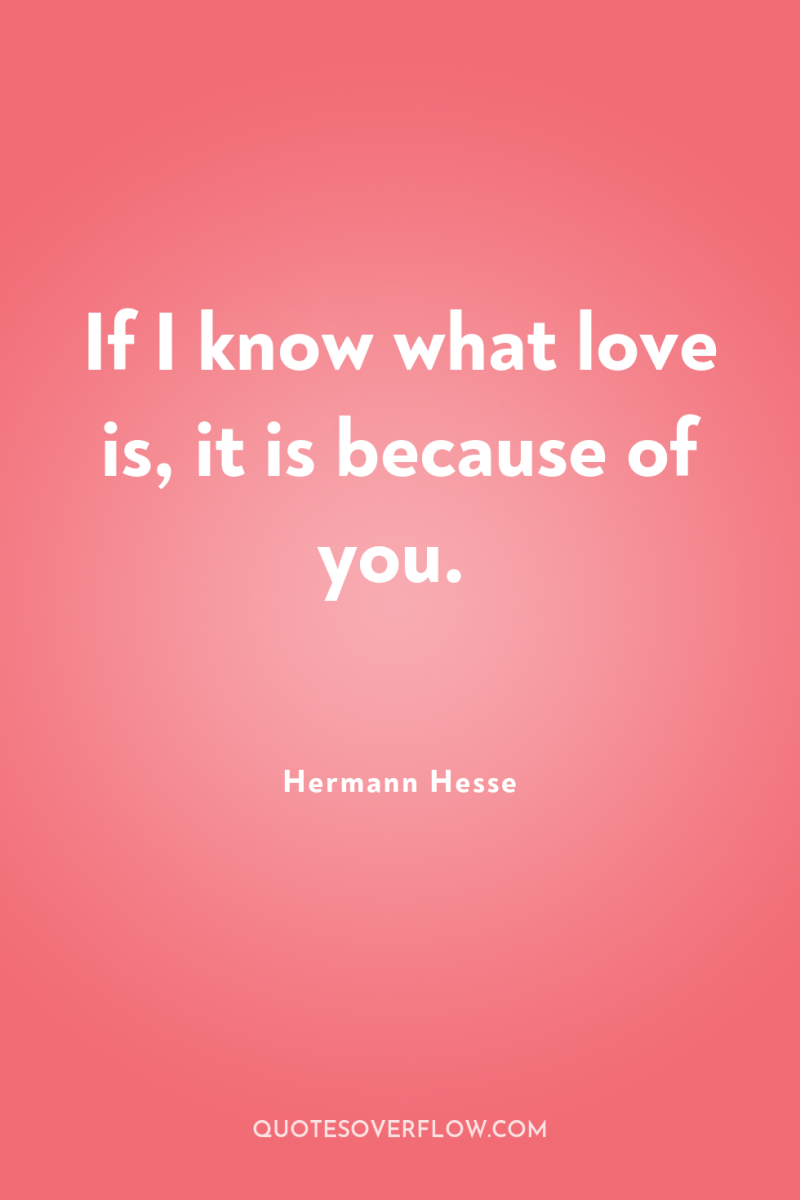
1
If I know what love is, it is because of you.Hermann Hesse
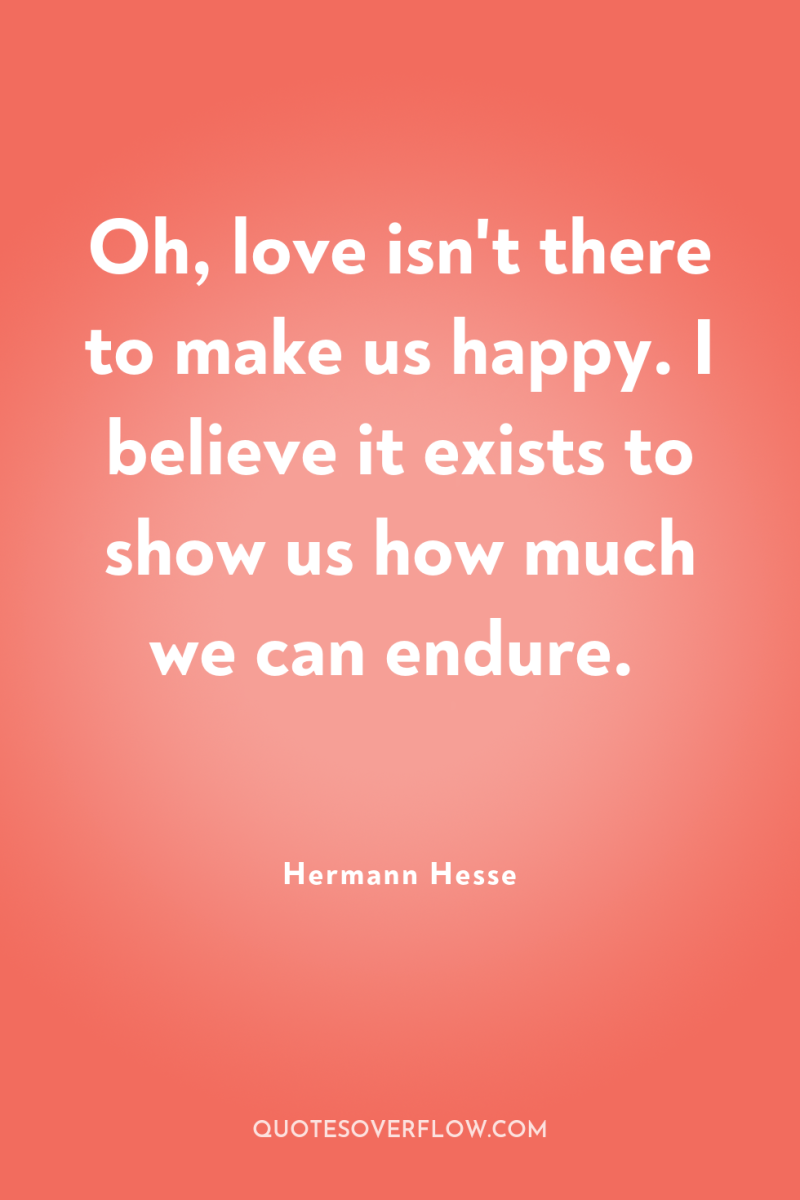
2
Oh, love isn't there to make us happy. I believe it exists to show us how much we can endure.Hermann Hesse

3
Often it is the most deserving people who cannot help loving those who destroy them.Hermann Hesse
4
It may be important to great thinkers to examine the world, to explain and despise it. But I think it is only important to love the world, not to despise it, not for us to hate each other, but to be able to regard the world and ourselves and all beings with love, admiration and respect.Hermann Hesse
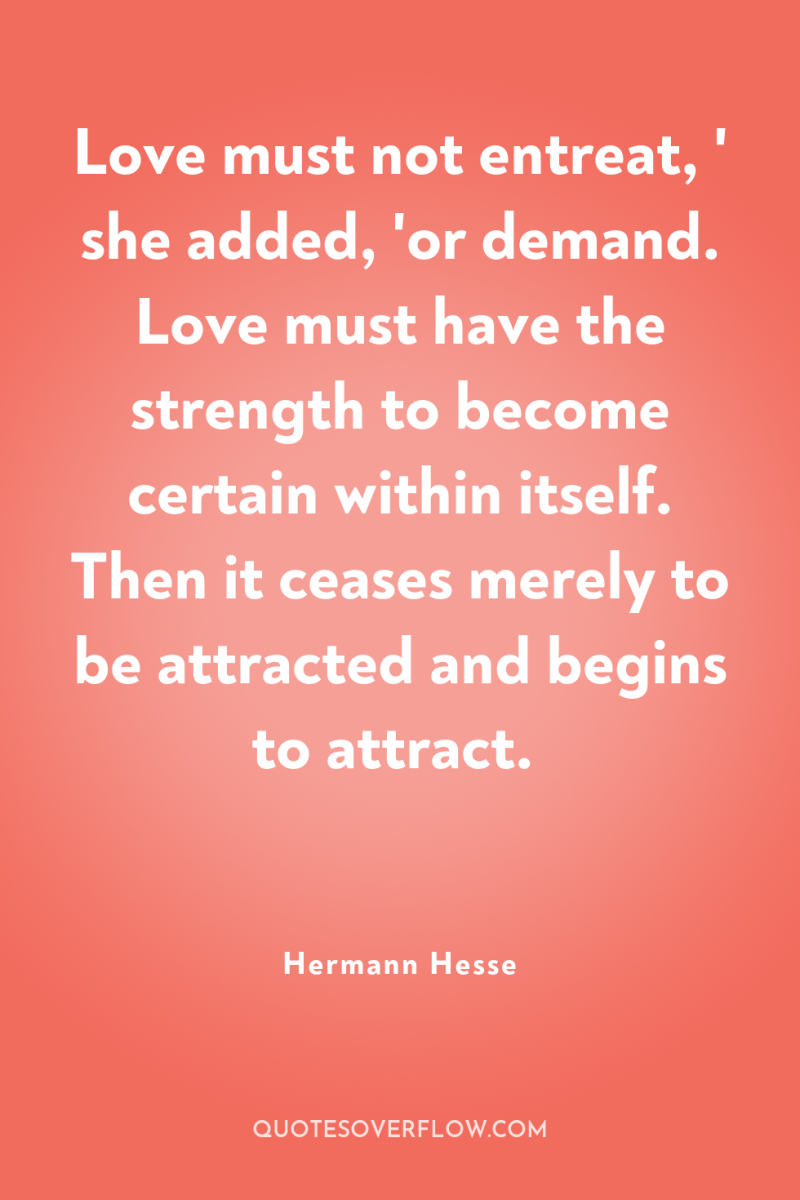
5
Love must not entreat, ' she added, 'or demand. Love must have the strength to become certain within itself. Then it ceases merely to be attracted and begins to attract.Hermann Hesse

6
When you like someone, you like them in spite of their faults. When you love someone, you love them with their faults.Hermann Hesse
7
So she thoroughly taught him that one cannot take pleasure without giving pleasure, and that every gesture, every caress, every touch, every glance, every last bit of the body has its secret, which brings happiness to the person who knows how to wake it. She taught him that after a celebration of love the lovers should not part without admiring each other, without being conquered or having conquered, so that neither is bleak or glutted or has the bad feeling of being used or misused.Hermann Hesse

8
Perhaps people like us cannot love. Ordinary people can - that is their secret.Hermann Hesse
9
You know quite well, deep within you, that there is only a single magic, a single power, a single salvation...and that is called loving. Well, then, love your suffering. Do not resist it, do not flee from it. It is your aversion that hurts, nothing else.Hermann Hesse
10
For me, trees have always been the most penetrating preachers. I revere them when they live in tribes and families, in forests and groves. And even more I revere them when they stand alone. They are like lonely persons. Not like hermits who have stolen away out of some weakness, but like great, solitary men, like Beethoven and Nietzsche. In their highest boughs the world rustles, their roots rest in infinity; but they do not lose themselves there, they struggle with all the force of their lives for one thing only: to fulfil themselves according to their own laws, to build up their own form, to represent themselves. Nothing is holier, nothing is more exemplary than a beautiful, strong tree. When a tree is cut down and reveals its naked death-wound to the sun, one can read its whole history in the luminous, inscribed disk of its trunk: in the rings of its years, its scars, all the struggle, all the suffering, all the sickness, all the happiness and prosperity stand truly written, the narrow years and the luxurious years, the attacks withstood, the storms endured. And every young farmboy knows that the hardest and noblest wood has the narrowest rings, that high on the mountains and in continuing danger the most indestructible, the strongest, the ideal trees grow. Trees are sanctuaries. Whoever knows how to speak to them, whoever knows how to listen to them, can learn the truth. They do not preach learning and precepts, they preach, undeterred by particulars, the ancient law of life. A tree says: A kernel is hidden in me, a spark, a thought, I am life from eternal life. The attempt and the risk that the eternal mother took with me is unique, unique the form and veins of my skin, unique the smallest play of leaves in my branches and the smallest scar on my bark. I was made to form and reveal the eternal in my smallest special detail. A tree says: My strength is trust. I know nothing about my fathers, I know nothing about the thousand children that every year spring out of me. I live out the secret of my seed to the very end, and I care for nothing else. I trust that God is in me. I trust that my labor is holy. Out of this trust I live. When we are stricken and cannot bear our lives any longer, then a tree has something to say to us: Be still! Be still! Look at me! Life is not easy, life is not difficult. Those are childish thoughts. Let God speak within you, and your thoughts will grow silent. You are anxious because your path leads away from mother and home. But every step and every day lead you back again to the mother. Home is neither here nor there. Home is within you, or home is nowhere at all. A longing to wander tears my heart when I hear trees rustling in the wind at evening. If one listens to them silently for a long time, this longing reveals its kernel, its meaning. It is not so much a matter of escaping from one's suffering, though it may seem to be so. It is a longing for home, for a memory of the mother, for new metaphors for life. It leads home. Every path leads homeward, every step is birth, every step is death, every grave is mother. So the tree rustles in the evening, when we stand uneasy before our own childish thoughts: Trees have long thoughts, long-breathing and restful, just as they have longer lives than ours. They are wiser than we are, as long as we do not listen to them. But when we have learned how to listen to trees, then the brevity and the quickness and the childlike hastiness of our thoughts achieve an incomparable joy. Whoever has learned how to listen to trees no longer wants to be a tree. He wants to be nothing except what he is. That is home. That is happiness.Hermann Hesse
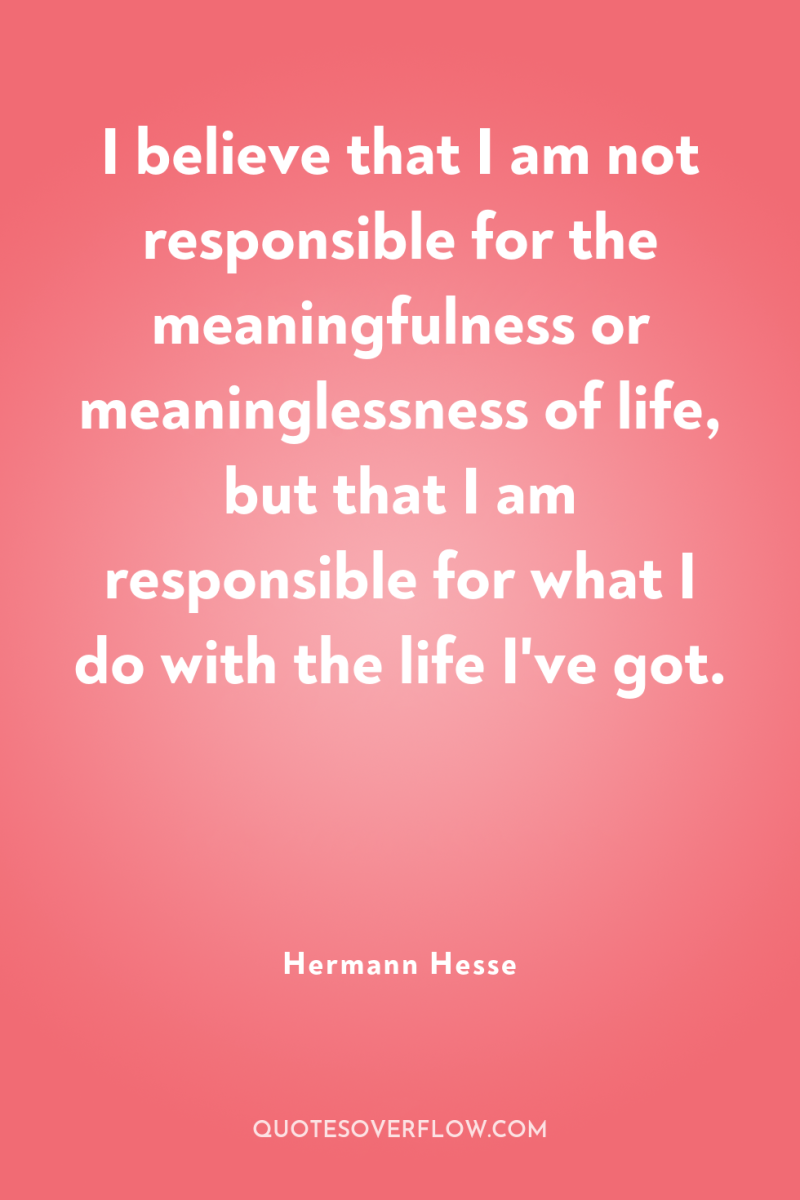
11
I believe that I am not responsible for the meaningfulness or meaninglessness of life, but that I am responsible for what I do with the life I've got.Hermann Hesse
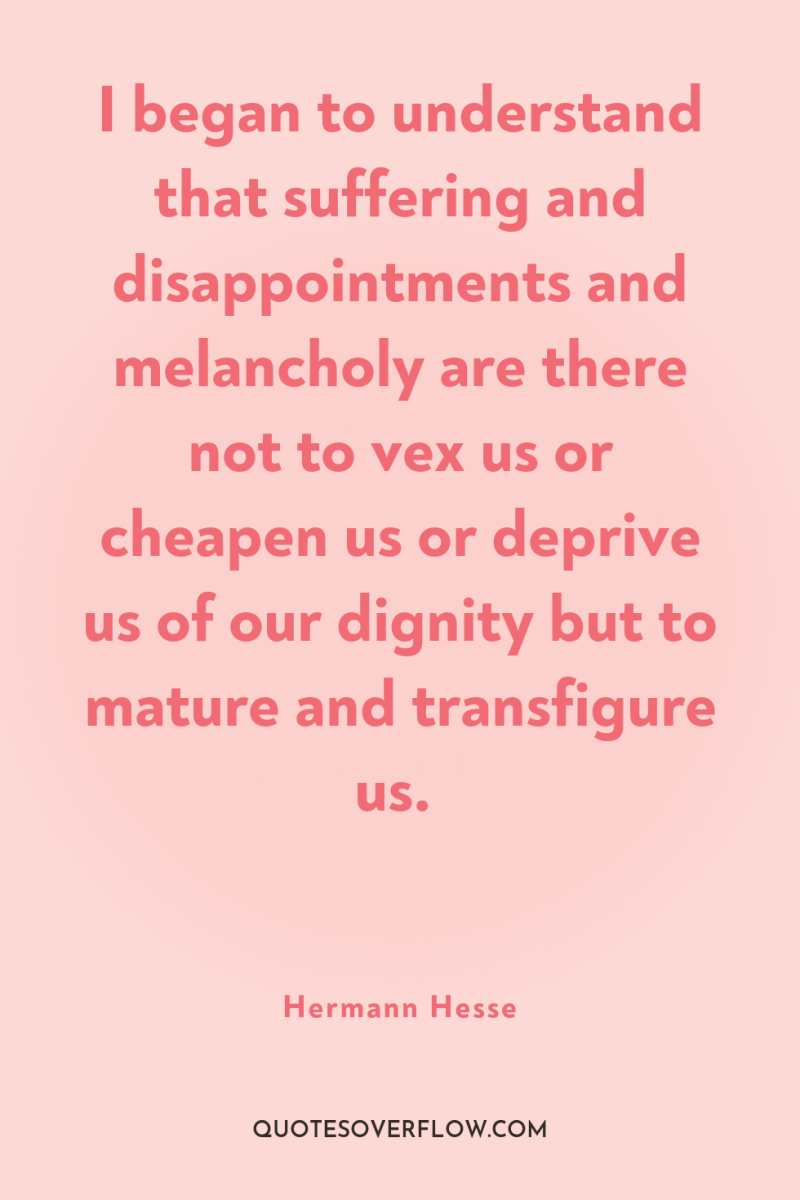
12
I began to understand that suffering and disappointments and melancholy are there not to vex us or cheapen us or deprive us of our dignity but to mature and transfigure us.Hermann Hesse
13
When someone is seeking, ” said Siddartha, “It happens quite easily that he only sees the thing that he is seeking; that he is unable to find anything, unable to absorb anything, because he is only thinking of the thing he is seeking, because he has a goal, because he is obsessed with his goal. Seeking means: to have a goal; but finding means: to be free, to be receptive, to have no goal. You, O worthy one, are perhaps indeed a seeker, for in striving towards your goal, you do not see many things that are under your nose.Hermann Hesse

14
You've never lived what you are thinking, and that isn't good. Only the ideas we actually live are of any value.Hermann Hesse
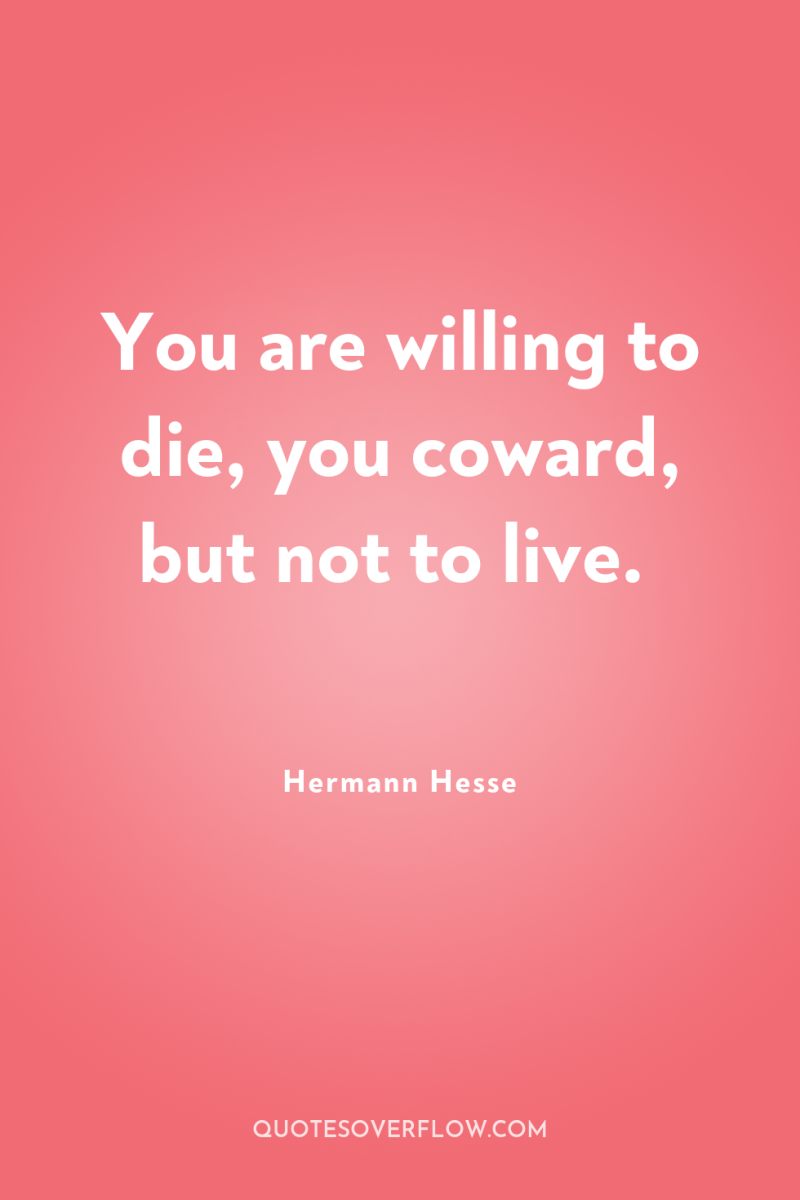
15
You are willing to die, you coward, but not to live.Hermann Hesse
16
Every man is more than just himself; he also represents the unique, the very special and always significant and remarkable point at which the world's phenomena intersect, only once in this way, and never again. That is why every man's story is important, eternal, sacred; that is why every man, as long as he lives and fulfills the will of nature, is wondrous, and worthy of consideration. In each individual the spirit has become flesh, in each man the creation suffers, within each one a redeemer is nailed to the cross.Hermann Hesse

17
In eternity there is no time, only an instant long enough for a joke.Hermann Hesse
18
O how incomprehensible everything was, and actually sad, although it was also beautiful. One knew nothing. One lived and ran about the earth and rode through forests, and certain things looked so challenging and promising and nostalgic: a star in the evening, a blue harebell, a reed-green pond, the eye of a person or a cow. And sometimes it seemed that something never seen yet long desired was about to happen, that a veil would drop from it all, but then it passed, nothing happened, the riddle remained unsolved, the secret spell unbroken, and in the end one grew old and looked cunning . . or wise . and still one knew nothing perhaps, was still waiting and listening.Hermann Hesse
19
Oh, if only it were possible to find understanding, ” Joseph exclaimed. “If only there were a dogma to believe in. Everything is contradictory, everything tangential; there are no certainties anywhere. Everything can be interpreted one way and then again interpreted in the opposite sense. The whole of world history can be explained as development and progress and can also be seen as nothing but decadence and meaninglessness. Isn’t there any truth? Is there no real and valid doctrine?” The master had never heard him speak so fervently. He walked on in silence for a little, then said: “There is truth, my boy. But the doctrine you desire, absolute, perfect dogma that alone provides wisdom, does not exist. Nor should you long for a perfect doctrine, my friend. Rather, you should long for the perfection of yourself. The deity is within you, not in ideas and books. Truth is lived, not taught. Be prepared for conflicts, Joseph Knecht - I can see that they already have begun. .Hermann Hesse
20
The old man slowly raised himself from the piano stool, fixed those cheerful blue eyes piercingly and at the same time with unimaginable friendliness upon him, and said: "Making music together is the best way for two people to become friends. There is none easier. That is a fine thing. I hope you and I shall remain friends. Perhaps you too will learn how to make fugues, Joseph.Hermann Hesse
21
É muito mais lisonjeiro, (..)lutar-se por alguma coisa bela e ideal e saber ao mesmo tempo que não se conseguirá alcançá-la. Os ideais serão algo que se possa alcançar? Viveremos para cabar com a morte? Não, viveremos para temê-la e também para amá-la, e precisamente por causa da morte é que nossa vida vez por outra resplandece tão radiosa num belo instante.Hermann Hesse
22
Cada época, cada cultura, cada costume e tradição tem seu próprio estilo, tem sua delicadeza e sua severidade, suas belezas e crueldades, aceitam certos sofrimentos como naturais, sofrem pacientemente certas desgraças. O verdadeiro sofrimento, o verdadeiro inferno da vida humana reside ali onde se chocam duas culturas ou duas religiões. Um homem da antiguidade, que tivesse de viver na Idade Média, haveria de sentir-se tão afogado quanto um selvagem se sentiria em nossa civilização. Há momentos em que toda uma geração cai entre dois estilos de vida, e toda evidência, toda moral, toda salvação e inocência ficam perdidos para ela. Naturalmente isso não nos atinge da mesma maneira.Hermann Hesse
23
I will no longer mutilate and destroy myself in order to find a secret behind the ruins.Hermann Hesse
24
If only there were a dogma to believe in. Everything is contradictory, everything is tangential; there are no certainties anywhere. Everything can be interpreted one way and then again interpreted in the opposite sense. The whole of world history can be explained as development and progress and can also be seen as nothing but decadence and meaninglessness. Isn't there any truth? Is there no real and valid doctrine?" Joseph Knect said to his Music Master "there is truth, my boy. But the doctrine you desire, absolute perfect dogma that alone provides wisdom, does not exist. Nor should you long for a perfect doctrine, my friend rather, you should long for perfection in yourself. The deity is within you, not in ideas and books. Truth is lived not taught .Hermann Hesse
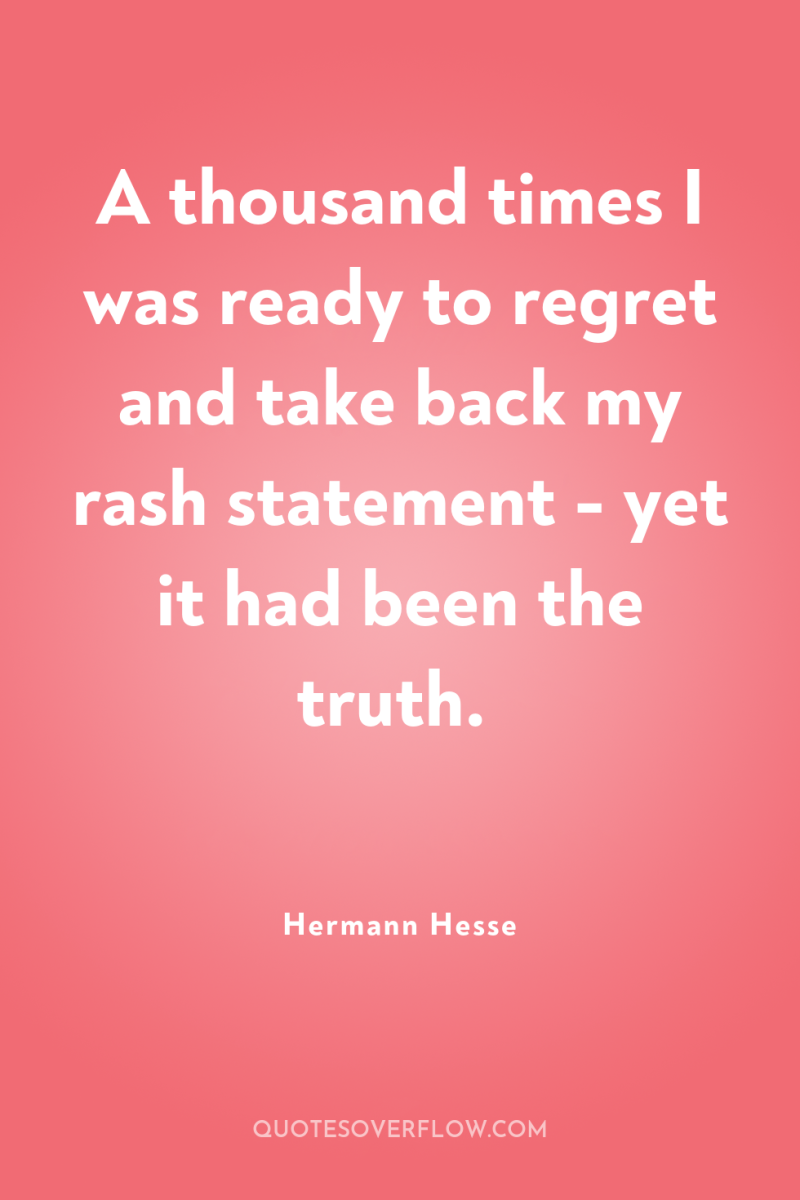
25
A thousand times I was ready to regret and take back my rash statement - yet it had been the truth.Hermann Hesse
26
Let me say no more. Words do no justice to the hidden meaning. Everything immediately becomes slightly different when it is expressed in words, a little bit distorted, a little foolish... It is perfectly fine with me that what for one man is precious wisdom for another sounds like foolery.Hermann Hesse
27
There is truth, my boy. But the doctrine you desire, absolute, perfect dogma that alone provides wisdom, does not exist. Nor should you long for a perfect doctrine, my friend. Rather, you should long for the perfection of yourself. The deity is within you, not in ideas and books. Truth is lived, not taught.Hermann Hesse
28
The whole of world history often seems to me nothing more than a picture book which portrays humanity's most powerful and a senseless desire - the desire to forget. Does not each generation, by means of suppression, concealment, and ridicule, efface what the previous generation considered most important?Hermann Hesse
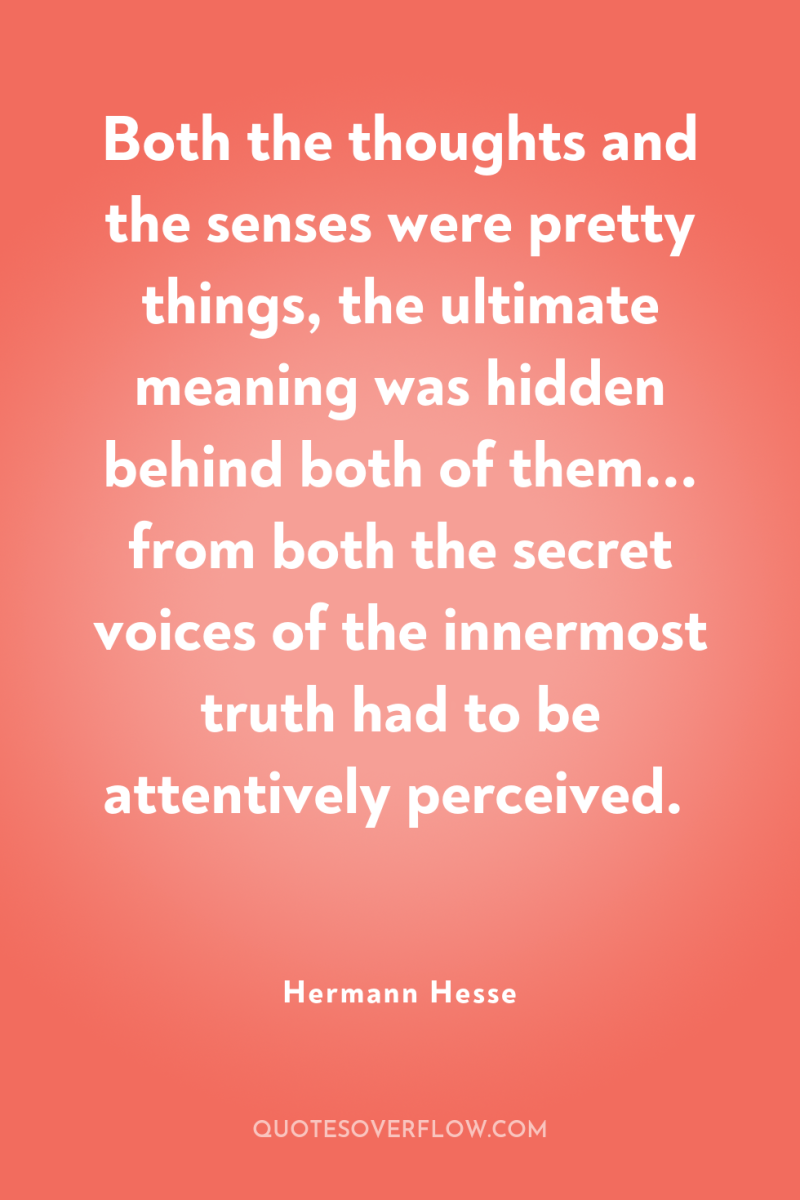
29
Both the thoughts and the senses were pretty things, the ultimate meaning was hidden behind both of them... from both the secret voices of the innermost truth had to be attentively perceived.Hermann Hesse
30
Сè проÑ‚ивречи едно на друго, Ñè проÑ‚рчува едно крај друго, никаде нема ÑигурноÑÑ‚. Сè може да Ñе Ñ‚олкува вака, и Ñè може да Ñе Ñ‚олкува обраÑ‚но. СеÑ‚а човечка иÑÑ‚орија може да Ñе проÑ‚олкува како развој и напредок, а иÑÑ‚овремено без да Ñе види нешÑ‚о повеќе од пропаÑÑ‚ и глупоÑÑ‚. Зар нема виÑÑ‚ина? Зар не поÑÑ‚ои виÑÑ‚инÑка и валидна наука?.Hermann Hesse
31
Wisdom cannot be imparted. Wisdom that a wise man attempts to impart always sounds like foolishness to someone else ... Knowledge can be communicated, but not wisdom. One can find it, live it, do wonders through it, but one cannot communicate and teach it.Hermann Hesse
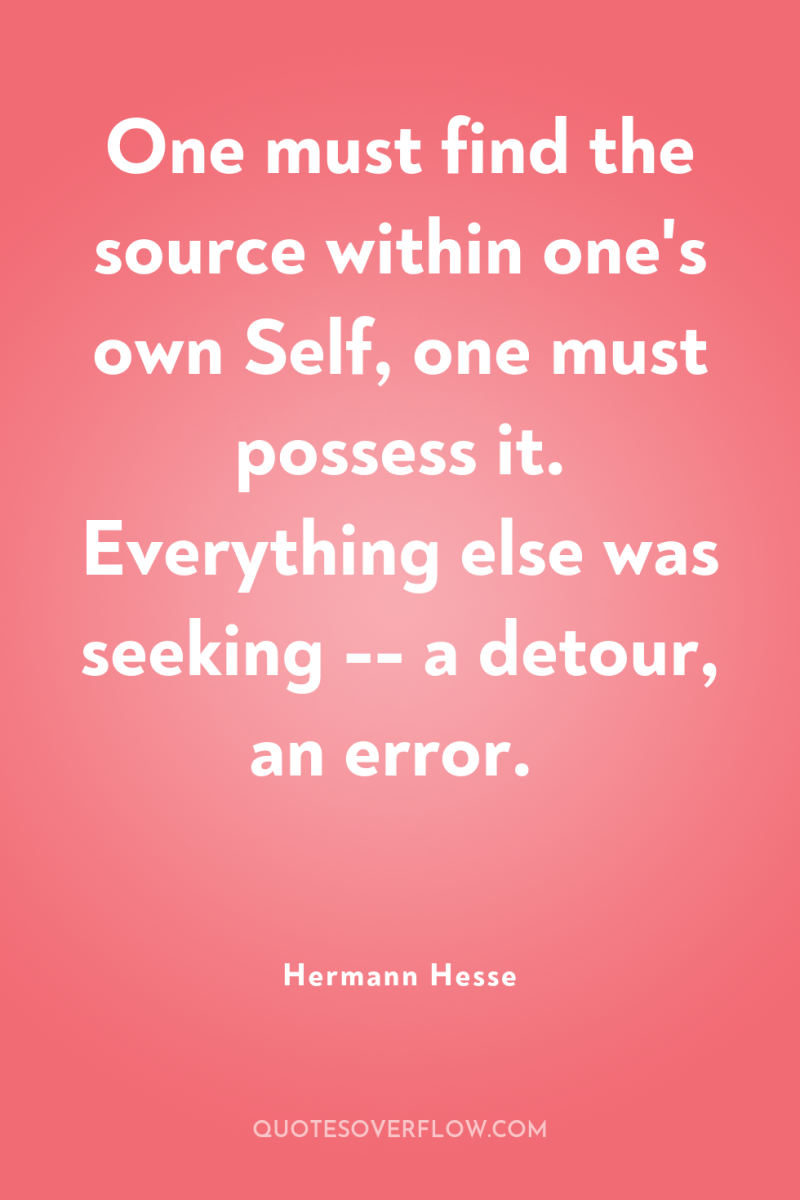
32
One must find the source within one's own Self, one must possess it. Everything else was seeking -- a detour, an error.Hermann Hesse
33
I call that man awake who, with conscious knowledge and understanding, can perceive the deep unreasoning powers in his soul, his whole innermost strength, desire and weakness, and knows how to reckon with himself.Hermann Hesse
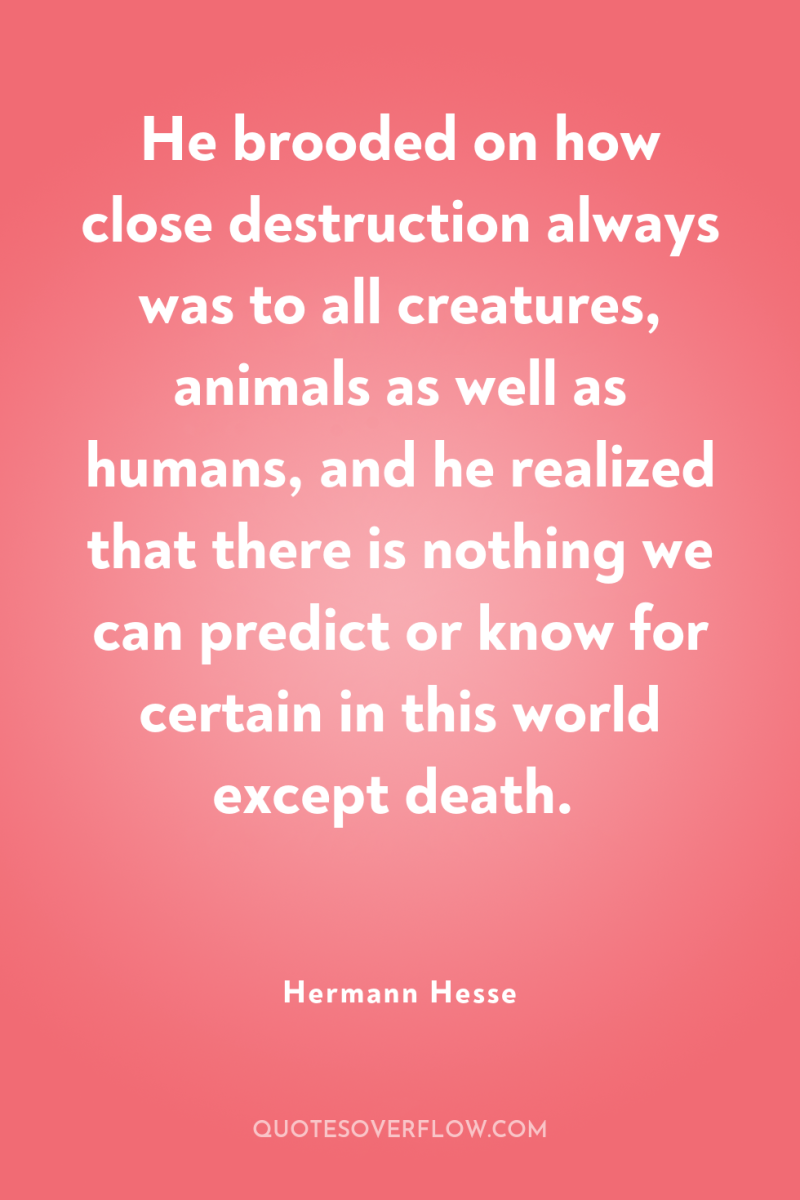
34
He brooded on how close destruction always was to all creatures, animals as well as humans, and he realized that there is nothing we can predict or know for certain in this world except death.Hermann Hesse
35
One of the disadwantages of school and learning, he thought dreamily, was that the mind seemed to have the tendency too see and represent all things as though they were flat and had only two dimensions. This, somehow, seemed to render all matters of intellect shallow and worthless...Hermann Hesse
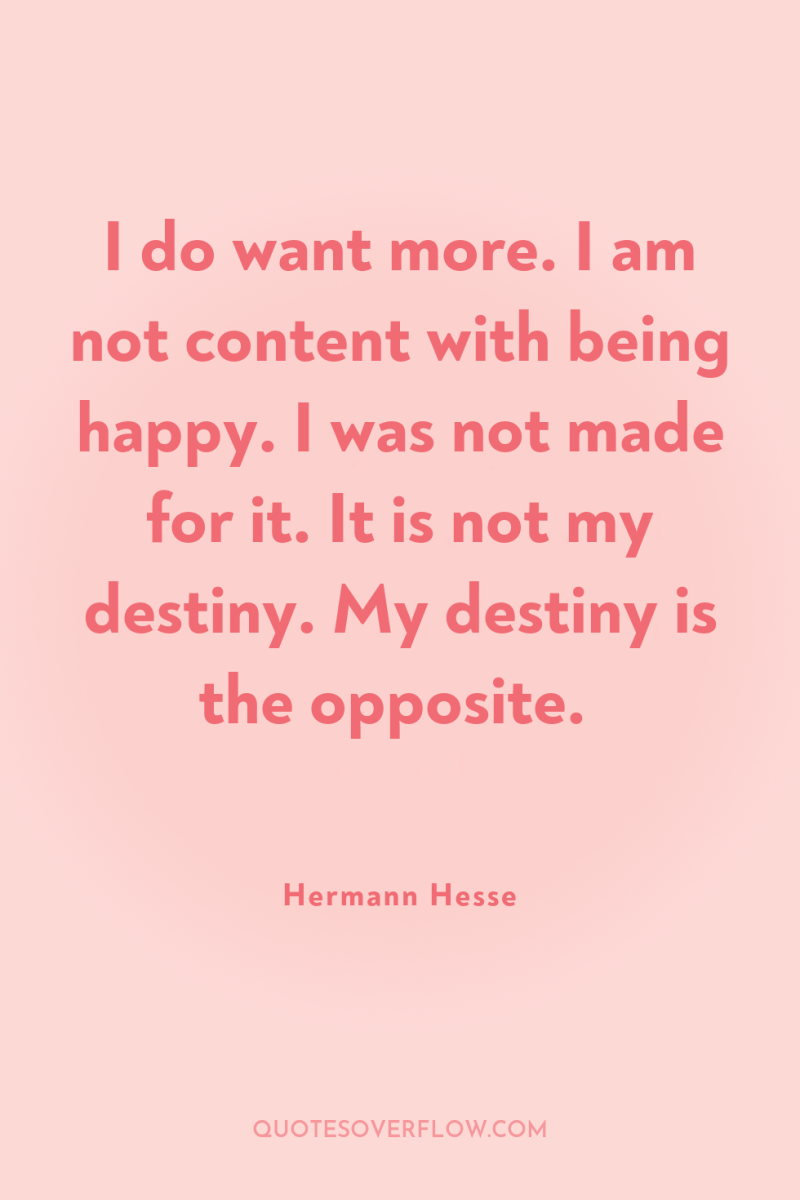
36
I do want more. I am not content with being happy. I was not made for it. It is not my destiny. My destiny is the opposite.Hermann Hesse
37
Once he said to her: 'You are like me; you are different from other people. You are Kamala and no one else, and within you there is a stillness and sanctuary to which you can retreat any time and be yourself, just as I can. Few people have that capacity and yet everyone could have it.Hermann Hesse
38
Times of terror and the deepest misery may arrive, but if there is to be any happiness in this misery it can only be a spiritual happiness, related to the past in the rescue of the culture of early ages and to the future in a serene and indefatigable championship of the spirit in a time which would otherwise completely swallow up the material.Hermann Hesse
39
We fear death, we shudder at life's instability, we grieve to see the flowers wilt again and again, and the leaves fall, and in our hearts we know that we, too, are transitory and will soon disappear. When artists create pictures and thinkers search for laws and formulate thoughts, it is in order to salvage something from the great dance of death, to make something last longer than we do.Hermann Hesse
40
Obedient to no man, dependent only on weather and season, without a goal before them or a roof above them, owning nothing, open to every whim of fate, the homeless wanderers lead their childlike, brave, shabby existence. They are the sons of Adam, who was driven out of Paradise; the brothers of the animals, of innocence. Out of heaven's hand they accept what is given them from moment to moment: sun, rain, fog, snow, warmth, cold, comfort, and hardship; time does not exist for them and neither does history, or ambition, or that bizarre idol called progress and evolution, in which houseowners believe so desperately. A wayfarer may be delicate or crude, artful or awkward, brave or cowardly–he is always a child at heart, living in the first day of creation, before the beginning of the history of the world, his life always guided by a few simple instincts and needs. He may be intelligent or stupid; he may be deeply aware of the fleeting fragility of all living things, of how pettily and fearfully each living creature carries its bit of warm blood through the glaciers of cosmic space, or he may merely follow the commands of his poor stomach with childlike greed–he is always the opponent, the deadly enemy of the established proprietor, who hates him, despises him, or fears him, because he does not wish to be reminded that all existence is transitory, that life is constantly wilting, that merciless icy death fills the cosmos all around.Hermann Hesse

41
Ich werde stehen und warten. Ich werde müde werden. Ich werde nicht einschlafen. Ich werde sterben.Hermann Hesse
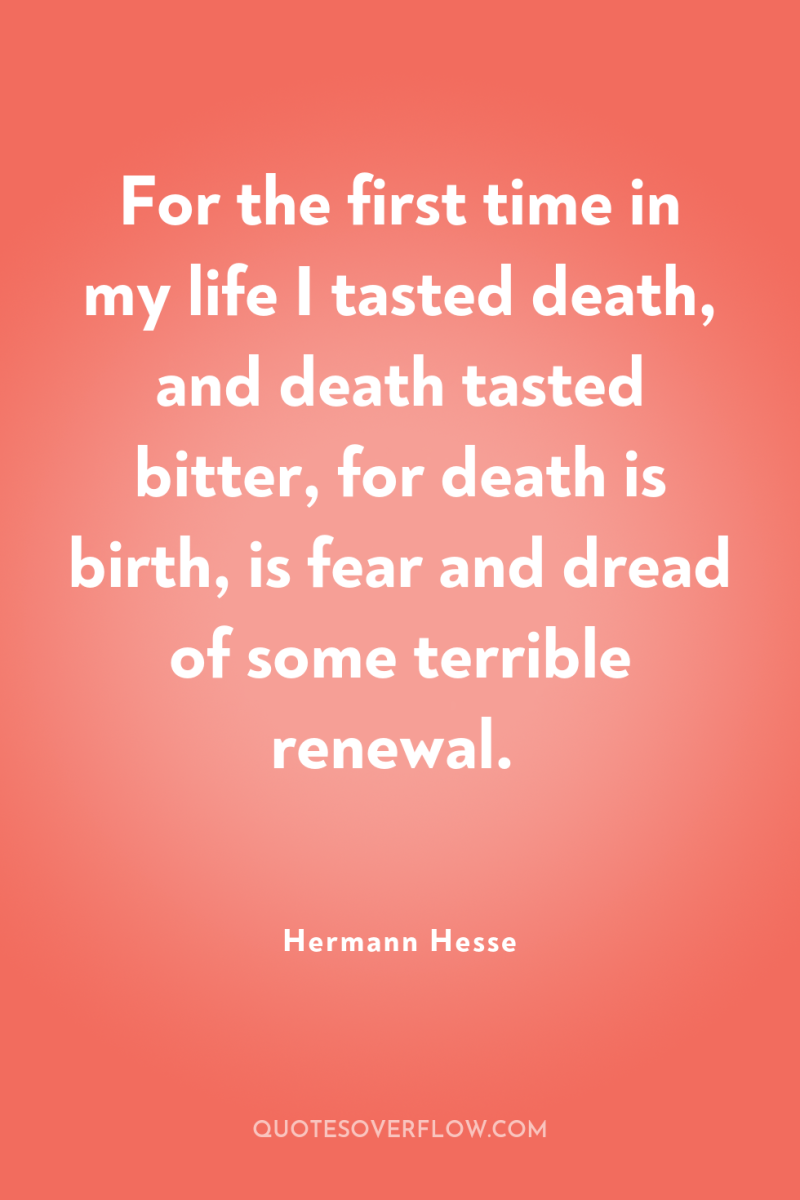
42
For the first time in my life I tasted death, and death tasted bitter, for death is birth, is fear and dread of some terrible renewal.Hermann Hesse
43
And some day there will be nothing left of everything that has twisted my life and grieved it and filled me so often with such anguish. Some day, with the last exhaustion, peace will come and the motherly earth will gather me back home. It won't be the end of things, only a way of being born again, a bathing and a slumbering where the old and the withered sink down, where the young and new begin to breathe. Then, with other thoughts, I will walk along streets like these, and listen to streams, and overhear what the sky says in the evening, over and over and over. .Hermann Hesse
44
Voll Blüten steht der Pfirsichbaum nicht jede wächst zur Frucht sie schimmern hell wie Rosenschaum durch Blau und Wolkenflucht. Wie Blüten geh'n Gedanken auf hundert an jedem Tag -- lass' blühen, lass' dem Ding den Lauf frag' nicht nach dem Ertrag! Es muss auch Spiel und Unschuld sein und Blütenüberfluss sonst wär' die Welt uns viel zu klein und Leben kein Genuss.Hermann Hesse
45
When I composed those verses I was preoccupied less with music than with an experience–an experience in which that beautiful musical allegory had shown its moral side, had become an awakening and a summons to a life vocation. The imperative form of the poem which specially displeases you is not the expression of a command and a will to teach but a command and warning directed towards myself. Even if you were not fully aware of this, my friend, you could have read it in the closing lines. I experienced an insight, you see, a realization and an inner vision, and wished to impress and hammer the moral of this vision into myself. That is the reason why this poem has remained in my memory. Whether the verses are good or bad they have achieved their aim, for the warning has lived on within me and has not been forgotten. It rings anew for me again to-day, and that is a wonderful little experience which your scorn cannot take away from me. .Hermann Hesse
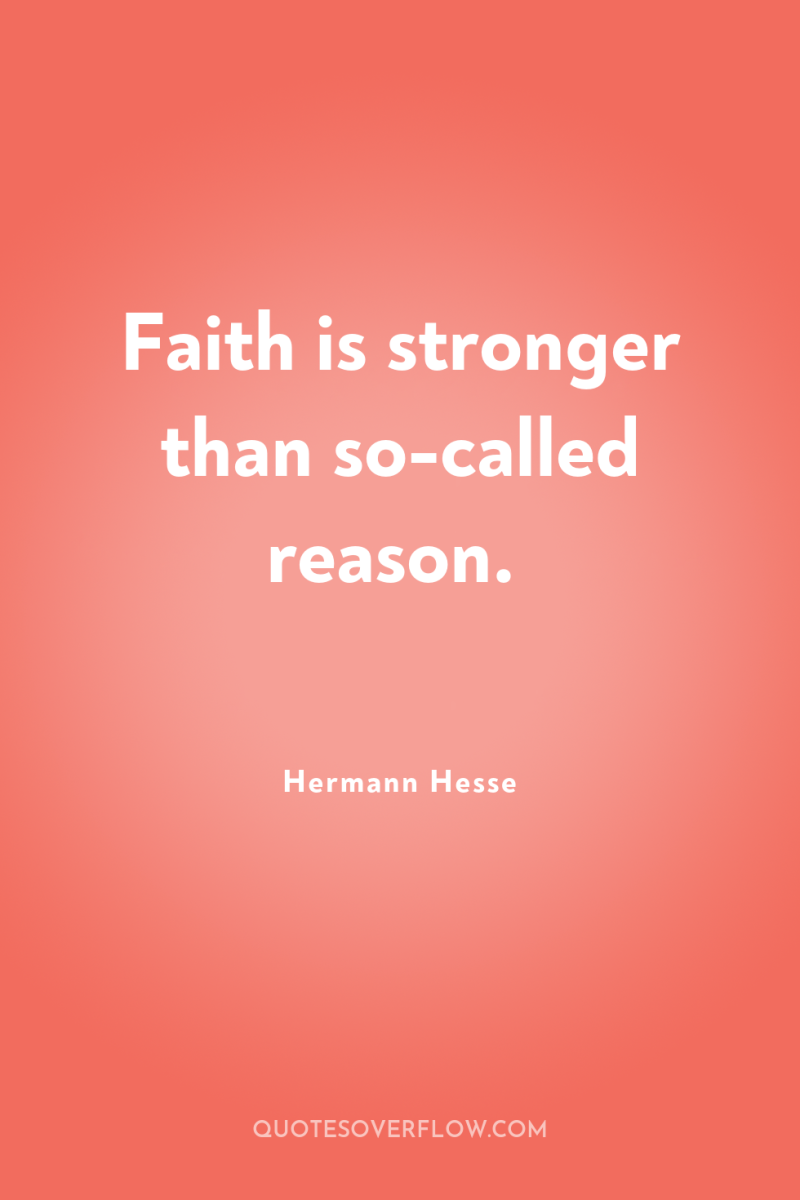
46
Faith is stronger than so-called reason.Hermann Hesse
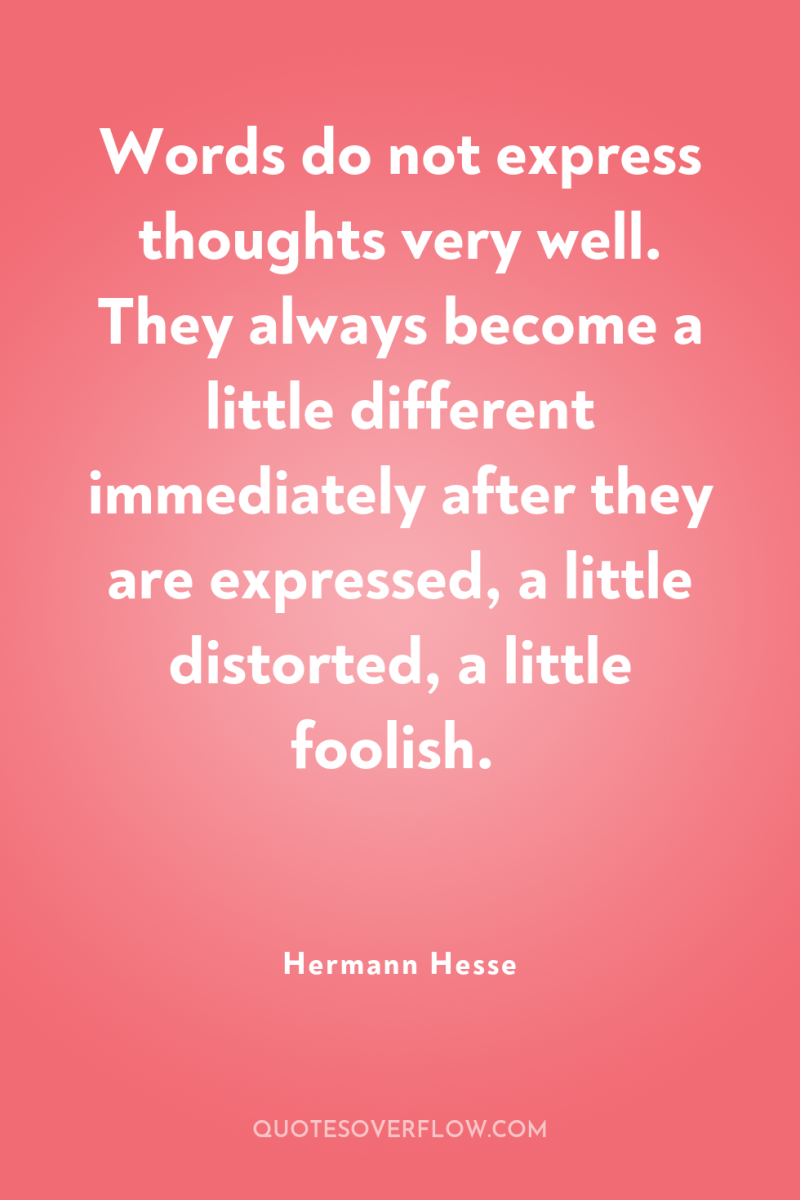
47
Words do not express thoughts very well. They always become a little different immediately after they are expressed, a little distorted, a little foolish.Hermann Hesse
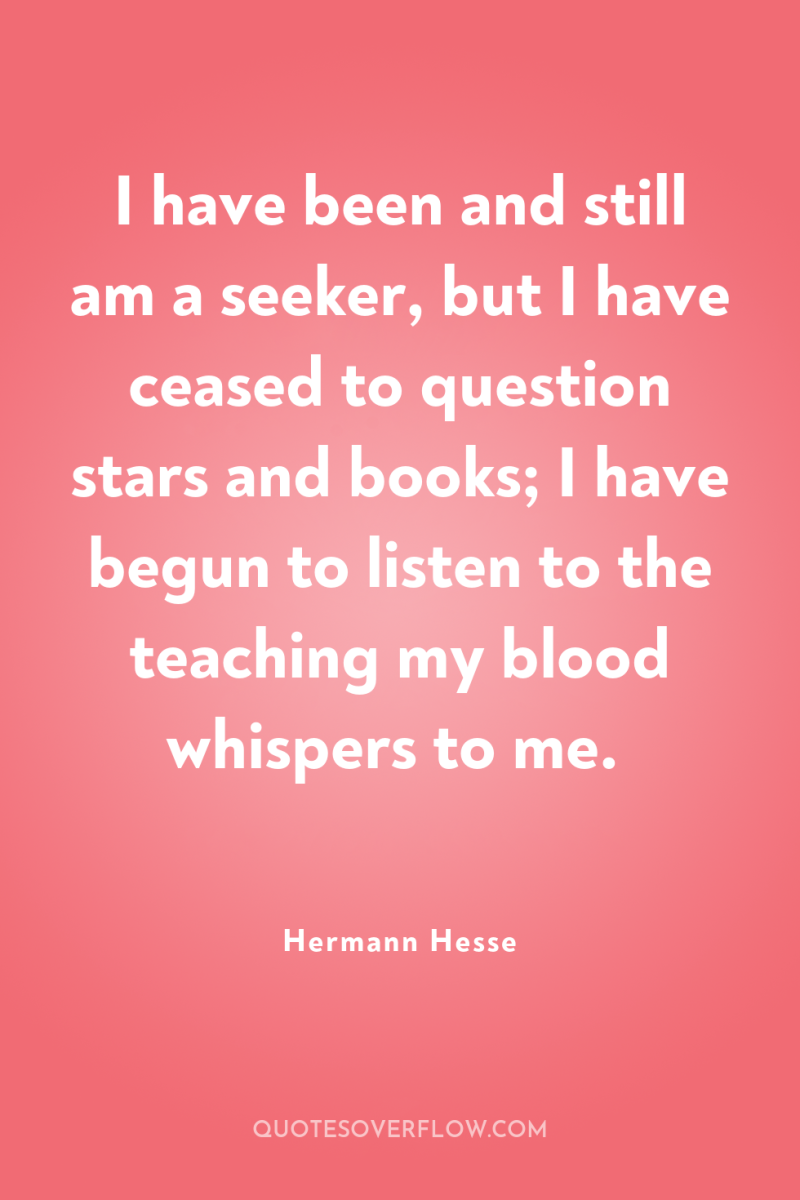
48
I have been and still am a seeker, but I have ceased to question stars and books; I have begun to listen to the teaching my blood whispers to me.Hermann Hesse
49
I called the world of phenomena an illusion, I called my eyes and my tongue and accident, valueless phenomena. No, that is all over; I have awakened, I have really awakened and have just been born today.Hermann Hesse
50
Novelists when they write novels tend to take an almost godlike attitude toward their subject, pretending to a total comprehension of the story, a man's life, which they can therefore recount as God Himself might, nothing standing between them and the naked truth, the entire story meaningful in every detail. I am as little able to do this as the novelist is, even though my story is more important to me than any novelist's is to him - for this is my story; it is the story of a man, not of an invented, or possible, or idealized, or otherwise absent figure, but of a unique being of flesh and blood, Yet, what a real living human being is made of seems to be less understood today than at any time before, and men - each one of whom represents a unique and valuable experiment on the part of nature - are therefore shot wholesale nowadays. If we were not something more than unique human beings, if each one of us could really be done away with once and for all by a single bullet, storytelling would lose all purpose. But every man is more than just himself; he also represents the unique, the very special and always significant and remarkable point at which the world's phenomena intersect, only once in this way and never again. That is why every man's story is important, eternal, sacred; that is why every man, as long as he lives and fulfills the will of nature, is wondrous, and worthy of every consideration. In each individual the spirit has become flesh, in each man the creation suffers, within each one a redeemer is nailed to the cross.Hermann Hesse
51
Pronto me di cuenta de que estas enseñanzas podÃan ser un consuelo sólo para los que las aceptaran literalmente y que creyeran ser la verdad. Si fueran, como para mÃ, en parte bella literatura, parte sÃmbolos intrincados; un intento de explicación mitológica del mundo, uno podrÃa instruirse y apreciarlas, pero uno no aprenderÃa la forma de vivir y sacar fuerza de ellas.Hermann Hesse

52
I have always thirsted for knowledge, I have always been full of questions.Hermann Hesse
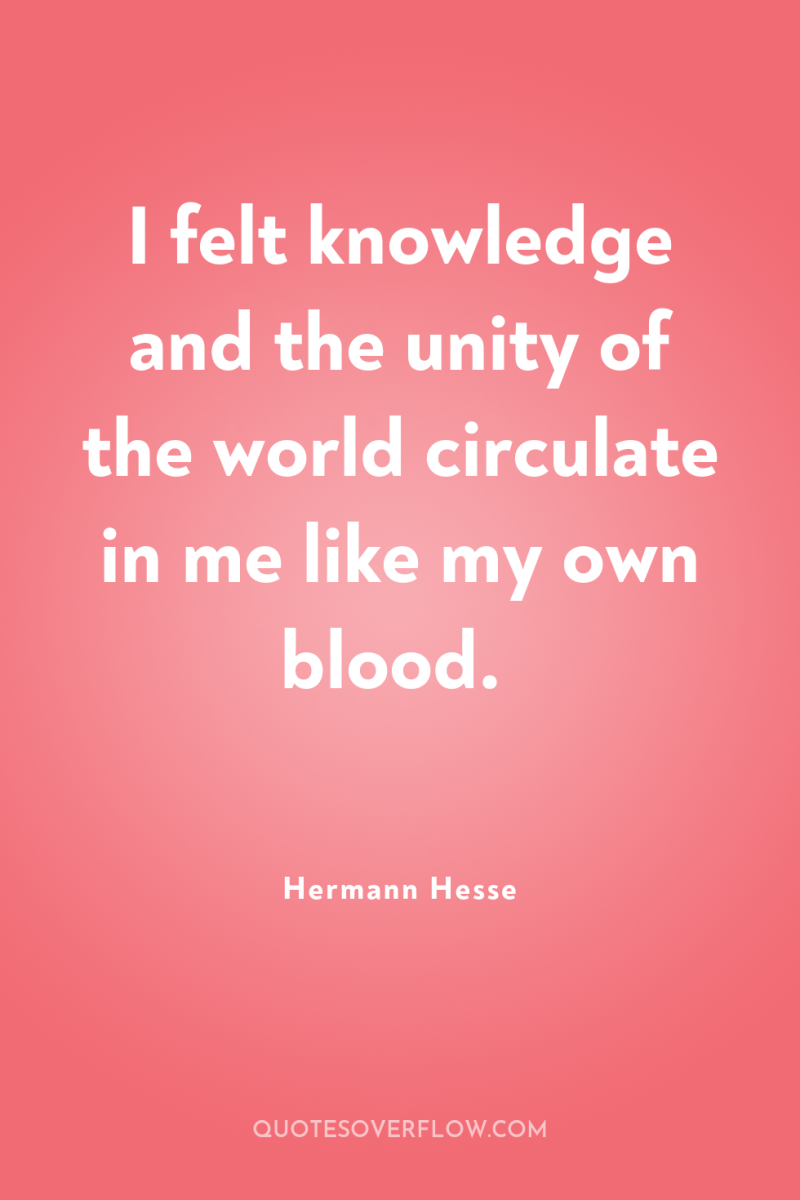
53
I felt knowledge and the unity of the world circulate in me like my own blood.Hermann Hesse
54
There is, so I believe, in the essence of everything, something that we cannot call learning. There is, my friend, only a knowledge-that is everywhere, that is Atman, that is in me and you and in every creature, and I am beginning to believe that this knowledge has no worse enemy than the man of knowledge, than learning.Hermann Hesse
55
Teachers dread nothing so much as unusual characteristics in precocious boys during the initial stages of their adolescence. A certain streak of genius makes an ominous impression on them, for there exists a deep gulf between genius and the teaching profession. Anyone with a touch of genius seems to his teachers a freak from the very first. As far as teachers are concerned, they define young geniuses as those who are bad, disrespectful, smoke at fourteen, fall in love at fifteen, can be found at sixteen hanging out in bars, read forbidden books, write scandalous essays, occasionally stare down a teacher in class, are marked in the attendance book as rebels, and are budding candidates for room-arrest. A schoolmaster will prefer to have a couple of dumbheads in his class than a single genius, and if you regard it objectively, he is of course right. His task is not to produce extravagant intellects but good Latinists, arithmeticians and sober decent folk. The question of who suffers more acutely at the other's hands - the teacher at the boy's, or vice versa - who is more of a tyrant, more of a tormentor, and who profanes parts of the other's soul, student or teacher, is something you cannot examine without remembering your own youth in anger and shame. yet that s not what concerns us here. We have the consolation that among true geniuses the wounds almost always heal. As their personalities develop, they create their art in spite of school. Once dead, and enveloped by the comfortable nimbus of remoteness, they are paraded by the schoolmasters before other generations of students as showpieces and noble examples. Thus teh struggle between rule and spirit repeats itself year after year from school to school. The authorities go to infinite pains to nip the few profound or more valuable intellects in the bud. And time and again the ones who are detested by their teachers are frequently punished, the runaways and those expelled, are the ones who afterwards add to society's treasure. But some - and who knows how many? - waste away quiet obstinacy and finally go under.Hermann Hesse
56
Thus the struggle between rule and spirit repeats itself year after year from school to school. The authorities go to infinite pains to nip the few profound or more valuable intellects in the bud. And time and again the ones who are detested by their teachers are frequently punished, the runaways and those expelled, are the ones who afterwards add to society's treasure. But some - and who knows how many? - waste away quiet obstinacy and finally go under. .Hermann Hesse
57
He was pleased with everything that he did and learned and the days and months passed quickly. But he learned more from the river than Vasudeva could teach him. He learned from it continually. Above all, he learned from it how to listen, to listen with a still heart, with a waiting, open soul, without passion, without desire, without judgment, without opinions.Hermann Hesse
58
I was not a good scholar, and during my last year at school I made little effort. This was not due to laziness … , but to a state of youthful day-dreaming and indifference … that was only … pierced when creative desire enveloped me like ether.Hermann Hesse
59
When someone is searching." said Siddhartha, "then it might easily happen that the only thing his eyes still see is what he searches for, that he is unable to find anything, to let anything enter his mind, because he always thinks of nothing but the object of his search, because he has a goal, because he is obsessed by the goal. Searching means: having a goal. But finding means: being free, being open, having no goal. You, oh venerable one, are perhaps indeed a searcher, because, striving for your goal, there are many things you don't see, which are directly in front of your eyes. .Hermann Hesse
60
Have you also learned that secret from the river; that there is no such thing as time?" That the river is everywhere at the same time, at the source and at the mouth, at the waterfall, at the ferry, at the current, in the ocean and in the mountains, everywhere and that the present only exists for it, not the shadow of the past nor the shadow of the future.Hermann Hesse
61
... the river is everywhere at once, at the source and at the mouth, at the waterfall, at the ferry, at the rapids, in the sea, in the mountains, everywhere at once, and that there is only the present time for it, not the shadow of the past, not the shadow of the future.Hermann Hesse
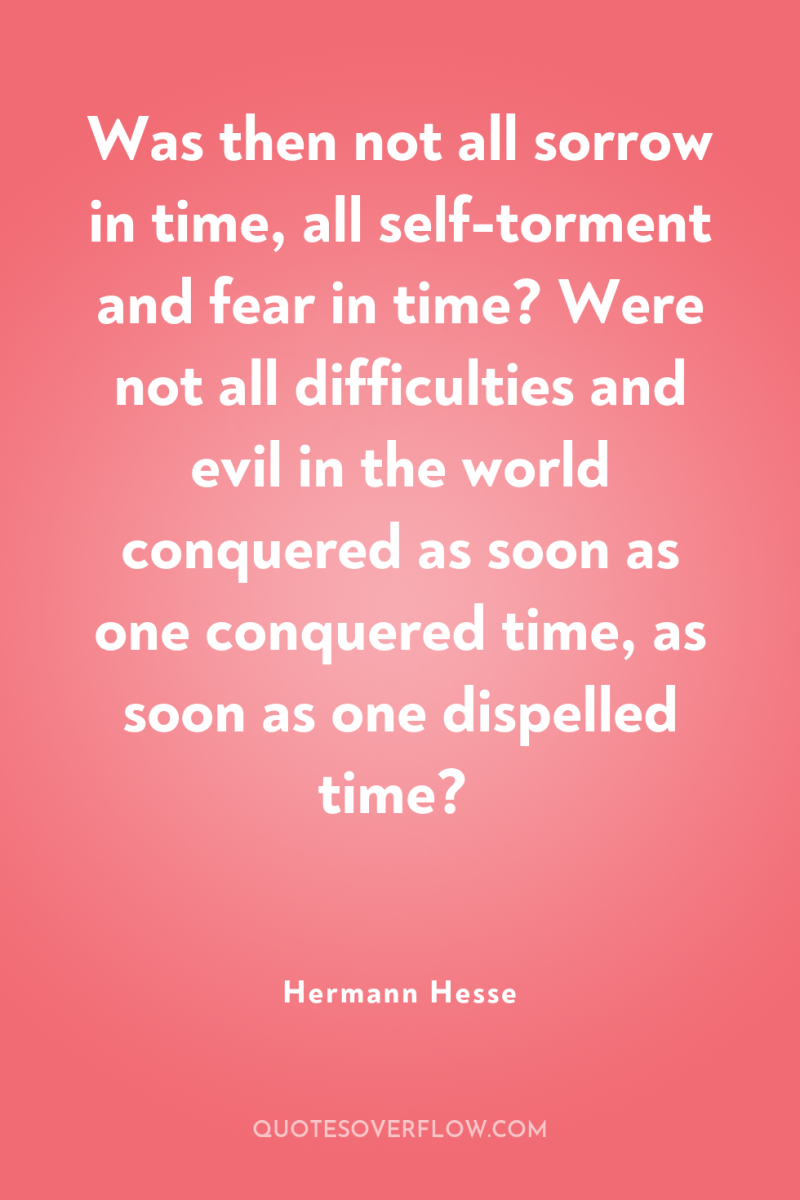
62
Was then not all sorrow in time, all self-torment and fear in time? Were not all difficulties and evil in the world conquered as soon as one conquered time, as soon as one dispelled time?Hermann Hesse
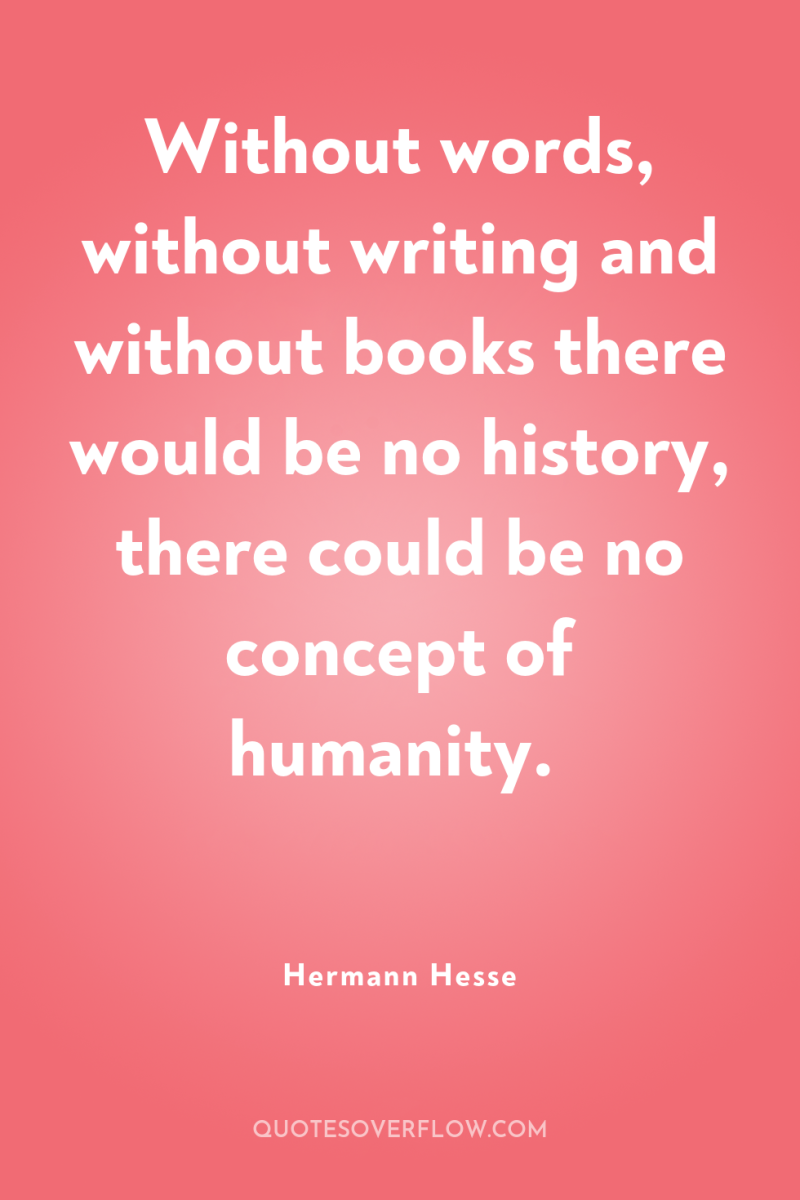
63
Without words, without writing and without books there would be no history, there could be no concept of humanity.Hermann Hesse
64
Among the many worlds which man did not receive as a gift of nature, but which he created with his own mind, the world of books is the greatest. Every child, scrawling his first letters on his slate and attempting to read for the first time, in so doing, enters an artificial and complicated world; to know the laws and rules of this world completely and to practice them perfectly, no single human life is long enough. Without words, without writing, and without books there would be no history, there could be no concept of humanity. And if anyone wants to try to enclose in a small space in a single house or single room, the history of the human spirit and to make it his own, he can only do this in the form of a collection of books. .Hermann Hesse
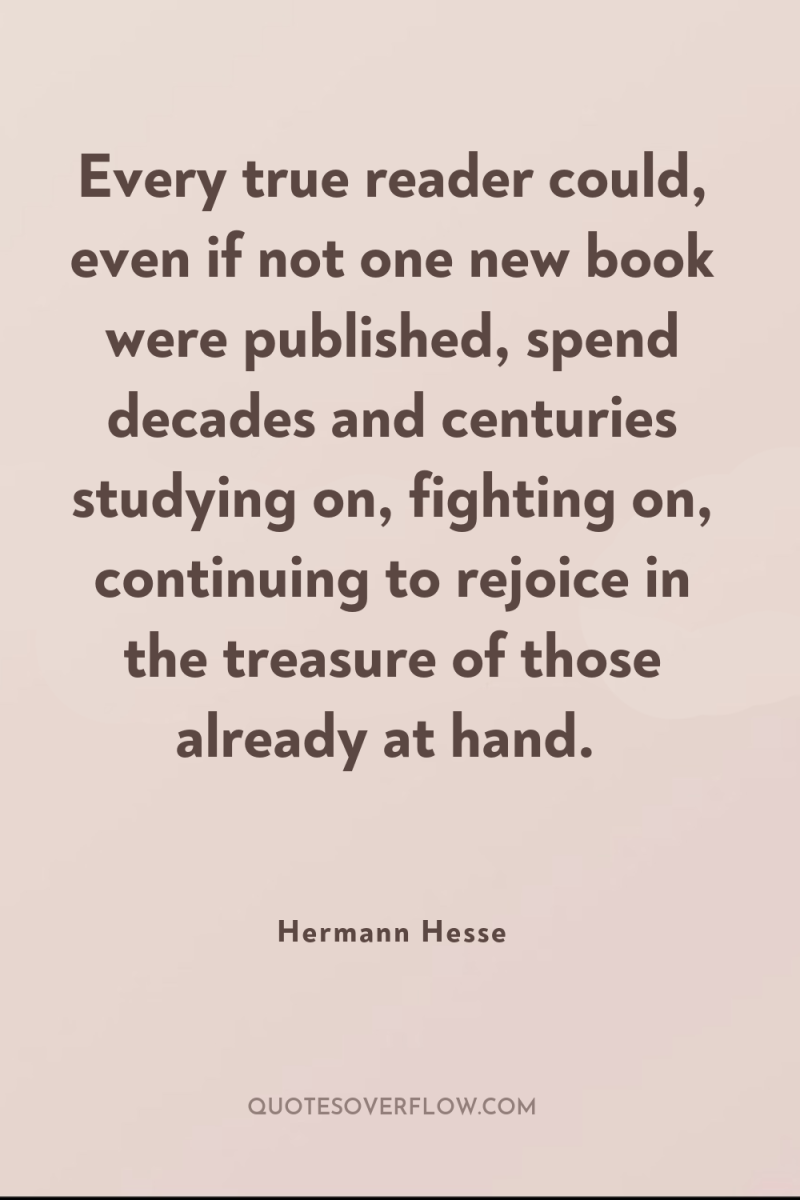
65
Every true reader could, even if not one new book were published, spend decades and centuries studying on, fighting on, continuing to rejoice in the treasure of those already at hand.Hermann Hesse
66
And many years later, as an adult student of history, Knecht was to perceive more distinctly that history cannot come into being without the substance and the dynamism of this sinful world of egoism and instinctuality, and that even such sublime creations as the Order were born in this cloudy torrent and sooner or later will be swallowed up by it again.. Nor was this ever merely an intellectual problem for him. Rather, it engaged his innermost self more than any other problem, and he felt it as partly his responsibility. His was one of those natures which can sicken, languish, and die when they see an ideal they have believed in, or the country and community they love, afflicted with ills. .Hermann Hesse
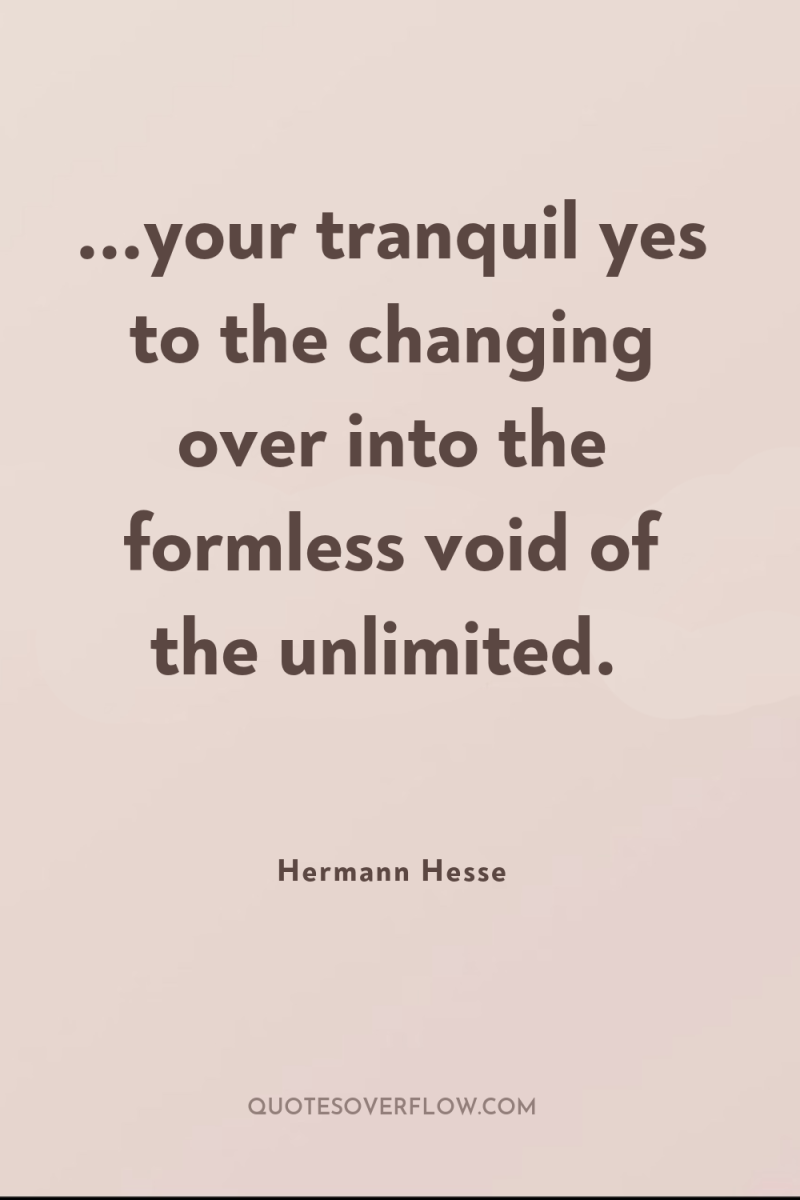
67
...your tranquil yes to the changing over into the formless void of the unlimited.Hermann Hesse
68
Oh, if I had had a friend at this moment, a friend in an attic room, dreaming by candlelight and with a violin lying ready at his hand! How I should have slipped up to him in his quiet hour, noiselessly climbing the winding stair to take him by surprise, and then with talk and music we should have held heavenly festival throughout the night!Hermann Hesse
69
Govinda was standing in front of him, dressed in the yellow robe of an ascetic. Sad was how Govinda looked like, sadly he asked: Why have you forsaken me? At this, he embraced Govinda, wrapped his arms around him, and as he was pulling him close to his chest and kissed him, it was not Govinda any more, but a woman, and a full breast popped out of the woman's dress, at which Siddhartha lay and drank, sweetly and strongly tasted the milk from this breast.Hermann Hesse

70
Everyone can perform magic, everyone can reach his goals, ifhe is able to think, if he is able to wait, if he is able to fast.Hermann Hesse
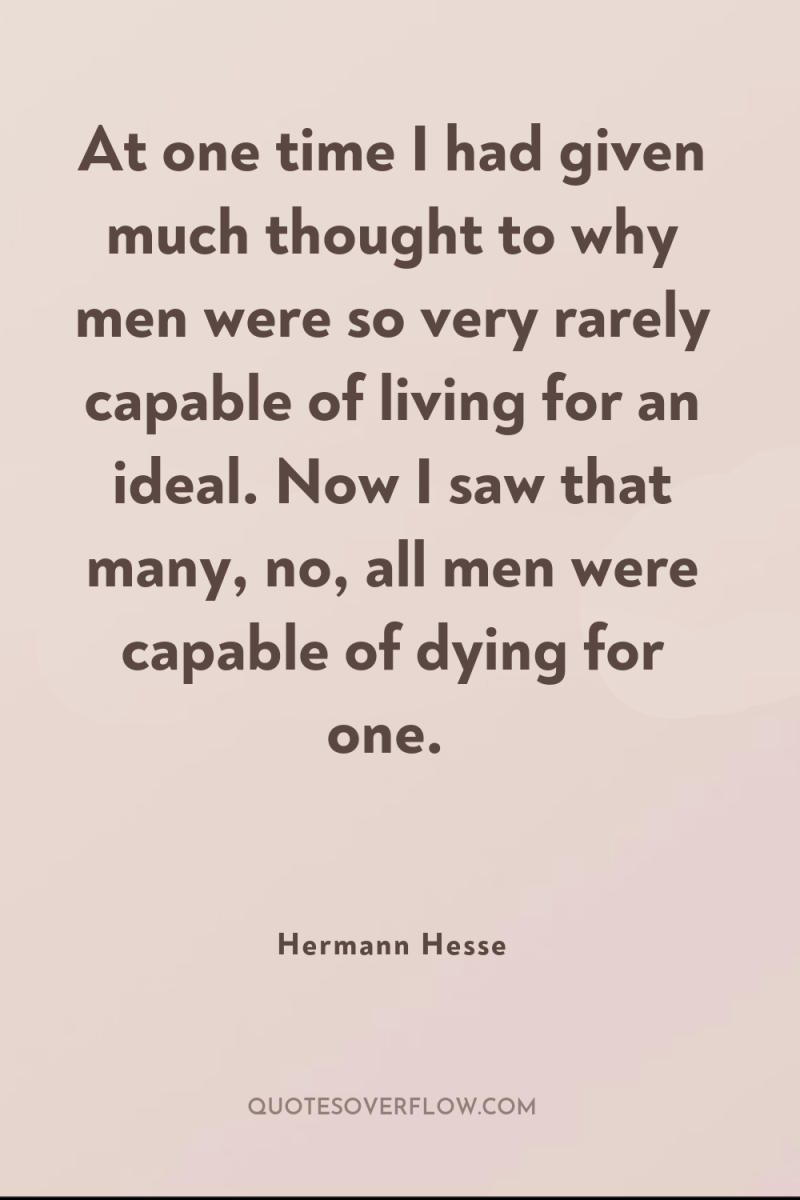
71
At one time I had given much thought to why men were so very rarely capable of living for an ideal. Now I saw that many, no, all men were capable of dying for one.Hermann Hesse
72
The world had been divided into two parts that sought to annihilate each other because they both desired the same thing, namely the liberation of the oppressed, the elimination of violence, and the establishment of permanent peace.Hermann Hesse
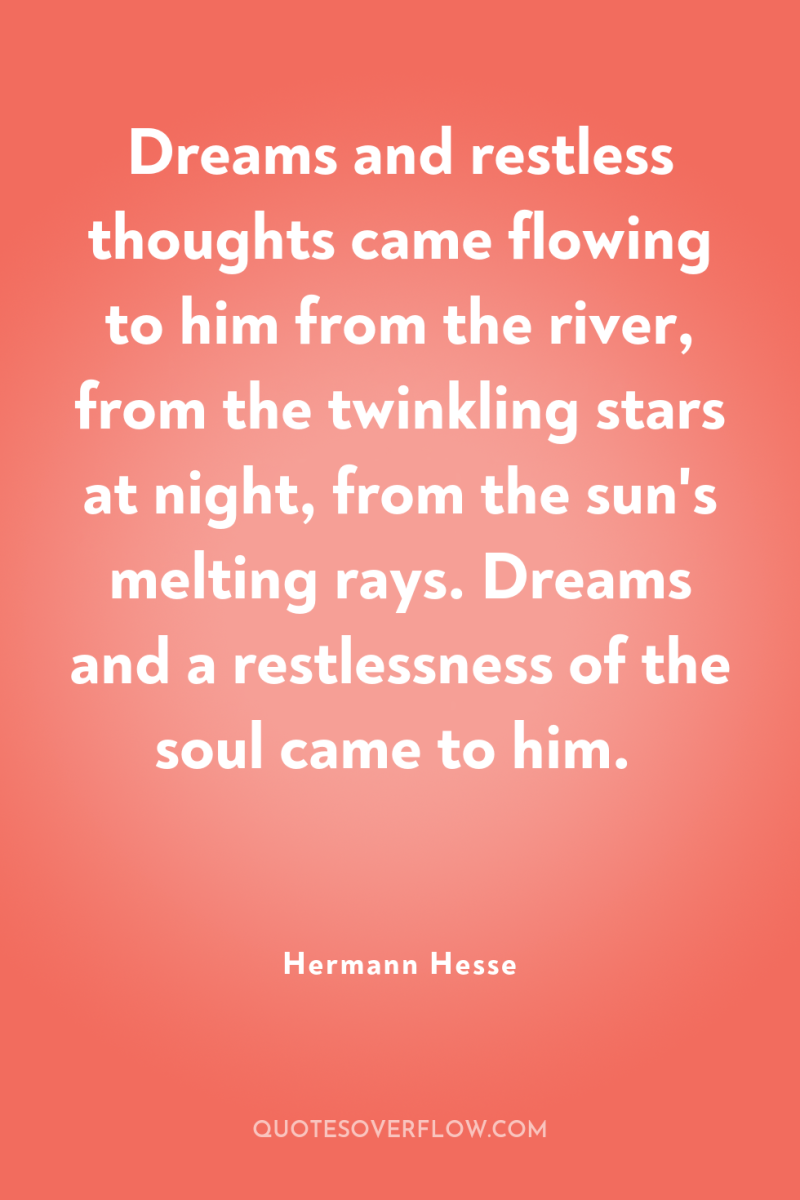
73
Dreams and restless thoughts came flowing to him from the river, from the twinkling stars at night, from the sun's melting rays. Dreams and a restlessness of the soul came to him.Hermann Hesse
74
Workshops, churches, and palaces were full of these fatal works of art; he had even helped with a few himself. They were deeply disappointing because they aroused the desire for the highest and did not fulfill it. They lacked to most essential thing–mystery. That was what dreams and truly great works of art had in common: mystery... It is mystery I love and pursue.Hermann Hesse
75
Workshops, churches, and palaces were full of these fatal works of art; he had even helped with a few himself. They were deeply disappointing because they aroused the desire for the highest and did not fulfill it. They lacked the most essential thing–mystery. That was what dreams and truly great works of art had in common: mystery... It is mystery I love and pursue.Hermann Hesse
76
Tegularius was a willful, moody person who refused to fit into his society. Every so often he would display the liveliness of his intellect. When highly stimulated he could be entrancing; his mordant wit sparkled and he overwhelmed everyone with the audacity and richness of his sometimes somber inspirations. But basically he was incurable, for he did not want to be cured; he cared nothing for co-ordination and a place in the scheme of things. He loved nothing but his freedom, his perpetual student status, and preferred spending his whole life as the unpredictable and obstinate loner, the gifted fool and nihilist, to following the path of subordination to the hierarchy and thus attaining peace. He cared nothing for peace, had no regard for the hierarchy, hardly minded reproof and isolation. Certainly he was a most inconvenient and indigestible component in a community whose idea was harmony and orderliness. But because of this very troublesomeness and indigestibility he was, in the midst of such a limpid and prearranged little world, a constant source of vital unrest, a reproach, an admonition and warning, a spur to new, bold, forbidden, intrepid ideas, an unruly, stubborn sheep in the herd.Hermann Hesse
77
What we can and should change is ourselves: our impatience, our egoism (including intellectual egoism), our sense of injury, our lack of love and forbearance. I regard every other attempt to change the world, even if it springs from the best intentions, as futile.Hermann Hesse
78
Between the dark, heavily laden treetops of the spreading chestnut trees could be seen the dark blue of the sky, full of stars, all solemn and golden, which extended their radiance unconcernedly into the distance. That was the nature of the stars. and the trees bore their buds and blossoms and scars for everyone to see, and whether it signified pleasure or pain, they accepted the strong will to live. flies that lived only for a day swarmed toward their death. every life had its radiance and beauty. i had insight into it all for a moment, understood it and found it good, and also found my life and sorrows good.Hermann Hesse
79
If a beautiful thing were to remain beautiful for all eternity, I'd be glad, but all the same I'd look at it with a colder eye. I'd say to myself: You can look at it any time, it doesn't have to be today.Hermann Hesse
80
On one part of the footpath where a thin trickle of water from a small spring kept it damp, I found … a swarm of … small, blue butterflies drinking the water. … I only went that way on sunny days and each time the dense, blue swarm was there, and each time it was a holiday.Hermann Hesse
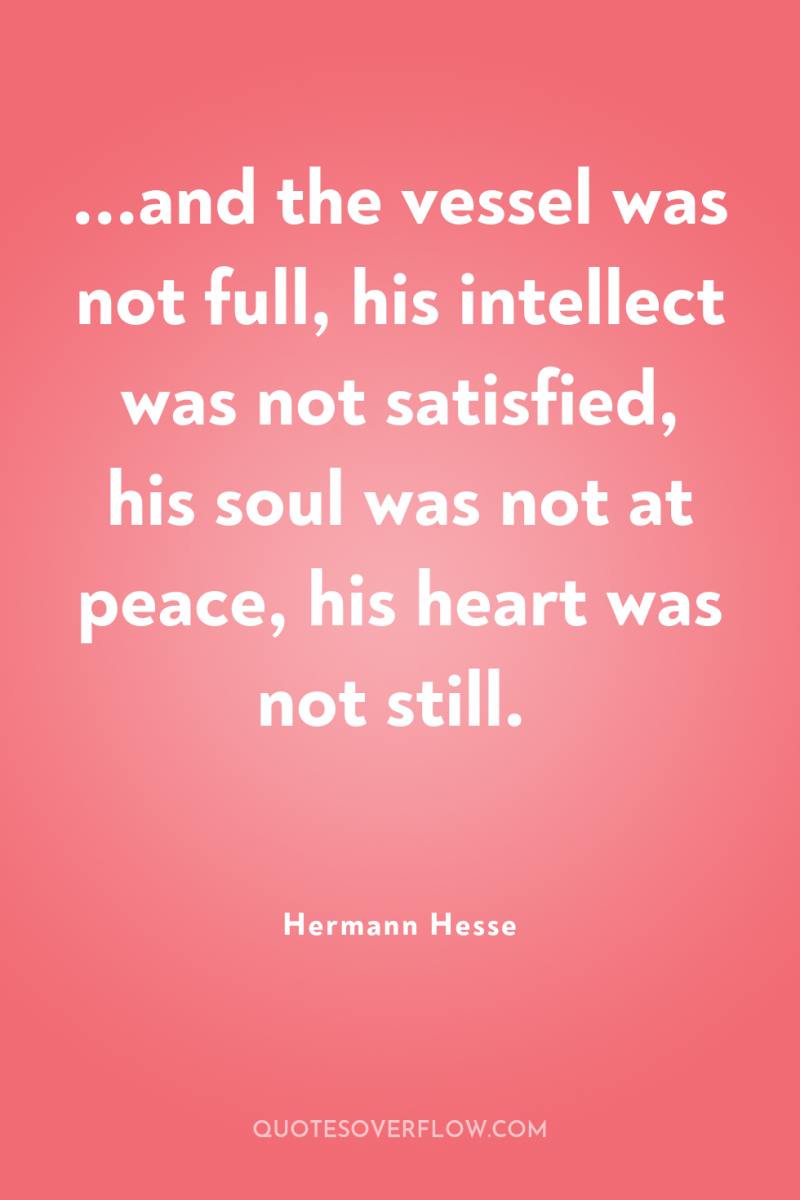
81
...and the vessel was not full, his intellect was not satisfied, his soul was not at peace, his heart was not still.Hermann Hesse
82
When a tree is polled, it will sprout new shoots nearer its roots. A soul that is ruined in the bud will frequently return to the springtime of its beginnings and its promise-filled childhood, as though it could discover new hopes there and retie the broken threads of life. The shoots grow rapidly and eagerly, but it is only a sham life that will never be a genuine tree.Hermann Hesse
83
...I thought, with a certain amount of sorrow, how much enormous talent there must be in the world for nature simply to toss it away so arbitrarily! But nature could not care less what we think about it, and as far as talent is concerned, there is such an excess that our artists will soon become their own audiences, and audiences made up of ordinary people will no longer exist.Hermann Hesse
84
It was shameless how life made fun of one; it was a joke, a cause for weeping! Either one lived and let one's senses play, drank full at the primitive mother's breast–which brought great bliss but was no protection against death; then one lived like a mushroom in the forest, colorful today and rotten tomorrow. Or else one put up a defense, imprisoned oneself for work and tried to build a monument to the fleeting passage of life–then one renounced life, was nothing but a tool; one enlisted in the service of that which endured, but one dried up in the process and lost one's freedom, scope, lust for life.. Ach, life made sense only if one achieved both, only if it was not split by this brittle alternative! To create, without sacrificing one's senses for it. To live, without renouncing the mobility of creating. Was that impossible? .Hermann Hesse
85
I had considered myself some kind of genius and had considerably underestimated the toils and difficulties encountered along the path to an art.Hermann Hesse
86
... nobody will obtain salvation by means of teachings!Hermann Hesse
87
Liberation from ego is what we shramanas are seeking, O Exalted One. If I were your disciple, O Venerable One, I'm afraid it might befall me that my ego would be pacified and liberated only seemingly, only illusorily, that in reality it would survive and grow great, for then I would make the teaching, my discipleship, my love for you, and the community of the monks into my ego!Hermann Hesse
88
We who bore the mark might well be considered by the rest of the world as strange, even as insane and dangerous. We had awoken, or were awakening, and we were striving for an ever perfect state of wakefulness, whereas the ambition and quest for happiness of the others consisted of linking their opinions, ideals, and duties, their life and happiness, ever more closely with those of the herd. They, too, strove; they, too showed signs of strength and greatness. But as we saw it, whereas we marked men represented Nature's determination to create something new, individual, and forward-looking, the others lived in the determination to stay the same. For them mankind--which they loved as much as we did--was a fully formed entity that had to be preserved and protected. For us mankind was a distant future toward which we were all journeying, whose aspect no one knew, whose laws weren't written down anywhere.Hermann Hesse
89
Each man had only one genuine vocation - to find the way to himself.... His task was to discover his own destiny - not an arbitrary one - and to live it out wholly and resolutely within himself. Everything else was only a would-be existence, an attempt at evasion, a flight back to the ideals of the masses, conformity and fear of one's own inwardness.Hermann Hesse
90
For me, trees have always been the most penetrating preachers. I revere them when they live in tribes and families, in forests and groves. And even more I revere them when they stand alone. They are like lonely persons. Not like hermits who have stolen away out of some weakness, but like great, solitary men, like Beethoven and Nietzsche. In their highest boughs the world rustles, their roots rest in infinity; but they do not lose themselves there, they struggle with all the force of their lives for one thing only: to fulfil themselves according to their own laws, to build up their own form, to represent themselves. Nothing is holier, nothing is more exemplary than a beautiful, strong tree. When a tree is cut down and reveals its naked death-wound to the sun, one can read its whole history in the luminous, inscribed disk of its trunk: in the rings of its years, its scars, all the struggle, all the suffering, all the sickness, all the happiness and prosperity stand truly written, the narrow years and the luxurious years, the attacks withstood, the storms endured. And every young farmboy knows that the hardest and noblest wood has the narrowest rings, that high on the mountains and in continuing danger the most indestructible, the strongest, the ideal trees grow.Hermann Hesse
91
His way had therefore come full circle, or rather had taken the form of an ellipse or a spiral, following as ever no straight unbroken line, for the rectilinear belongs only to Geometry and not to Nature and Life.Hermann Hesse
92
Thus Gotama [Buddha] walked toward the town to gather alms, and the two samanas recognized him solely by the perfection of his repose, by the calmness of his figure, in which there was no trace of seeking, desiring, imitating, or striving, only light and peaceHermann Hesse
93
Within yourself is a stillness and a sanctuary to which you can retreat at any time and be yourself.Hermann Hesse
94
The “music of decline” had sounded, as in that wonderful Chinese fable; like a thrumming bass on the organ its reverberations faded slowly out over decades; its throbbing could be heard in the corruption of the schools, periodicals, and universities, in melancholia and insanity among those artists and critics who could still be taken seriously; it raged as untrammeled and amateurish overproduction in all the arts.Hermann Hesse
95
Well, " he said with equanimity, "you see, in my opinion there is no point at all in talking about music. I never talk about music. What reply, then, was I to make to your very able and just remarks? You were perfectly right in all you said. But, you see, I am a musician, not a professor, and I don't believe that, as regards music, there is the least point in being right. Music does not depend on being right, on having good taste and education and all that."" Indeed. Then what does it depend on?"" On making music, Herr Haller, on making music as well and as much as possible and with all the intensity of which one is capable. That is the point, Monsieur. Though I carried the complete works of Bach and Haydn in my head and could say the cleverest things about them, not a soul would be the better for it. But when I take hold of my mouthpiece and play a lively shimmy, whether the shimmy be good or bad, it will give people pleasure. It gets into their legs and into their blood. That's the point and that alone. Look at the faces in a dance hall at the moment when the music strikes up after a longish pause, how eyes sparkle, legs twitch and faces begin to laugh. That is why one makes music. .Hermann Hesse
96
A melody occurs to you; you sing it silently, inwardly ... ; you steep your being in it; it takes possession of all your strength and emotions, and during the time it lives in you, it effaces all that is fortuitous, evil, coarse and sad in you; it brings the world into harmony with you, it makes burdens light and gives wings to the benumbed.Hermann Hesse
97
To hear for the duration of a heartbeat the universe and the totality of life in its mysterious, innate harmony.Hermann Hesse
98
On a strange and devious way, Siddhartha had gotten into this final and most base of all dependencies, by means of the game of dice. It was since that time, when he had stopped being a Samana in his heart, that Siddhartha began to play the game for money and precious things, which he at other times only joined with a smile and casually as a custom of the childlike people, with an increasing rage and passion. He was a feared gambler, few dared to take him on, so high and audacious were his stakes. He played the game due to a pain of his heart, losing and wasting his wretched money in the game brought him an angry joy, in no other way he could demonstrate his disdain for wealth, the merchants' false god, more clearly and more mockingly. .Hermann Hesse
99
At that moment, when the world around him melted away, when he stood alone like a star in the heavens, he was overwhelmed by a feeling of icy despair, but he was more firmly himself than ever. That was the last shudder of his awakening, the last pains of birth. Immediately he moved on again and began to walk quickly and impatiently, no longer homewards, no longer to his father, no longer looking backwards.Hermann Hesse
100
Our mind is capable of passing beyond the dividing line we have drawn for it. Beyond the pairs of opposites of which the world consists, other, new insights begin.Hermann Hesse